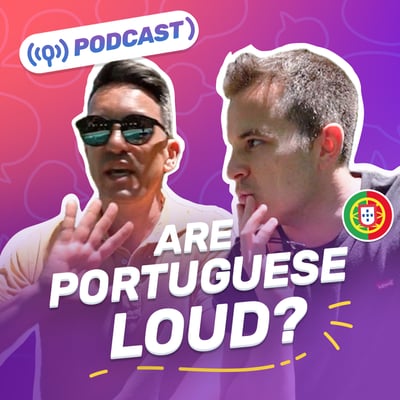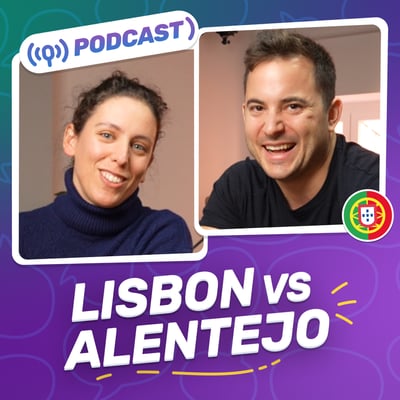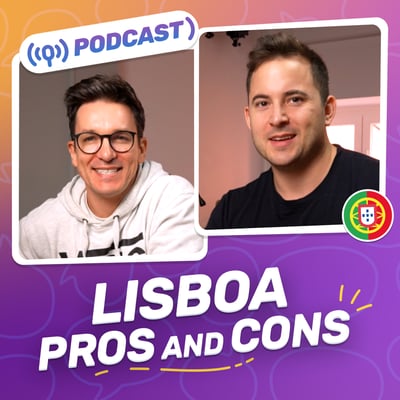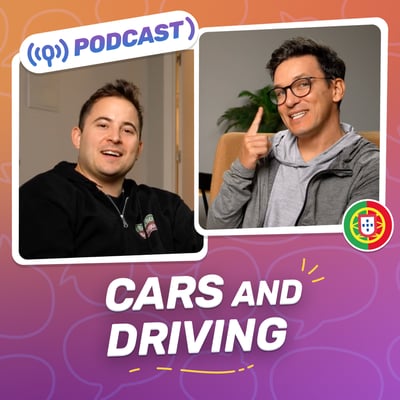1
00:00:01,050 –> 00:00:02,750
Joel: Gostas do novo cenário?
{{Joel: Do you like the new set?}}
2
00:00:02,750 –> 00:00:04,960
Rui: Gosto. Gosto do nosso galo!
{{Rui: I do. I like our rooster!}}
3
00:00:04,960 –> 00:00:07,590
Joel: Ah, mas este podcast é para os ouvintes,
{{Joel: Ah, but this podcast is for the listeners,}}
4
00:00:07,590 –> 00:00:10,940
não é para os… como se diz? Visualizadores.
{{not for the… how do you say? Viewers.}}
5
00:00:10,940 –> 00:00:12,480
Rui: Ah, é? Não vão ver?
{{Rui: Oh, it is? They aren’t going to watch?}}
6
00:00:12,480 –> 00:00:15,300
Então por que perdemos este tempo todo com luzes?
{{So why are we wasting all this time with lights?}}
7
00:00:15,300 –> 00:00:18,420
Joel: Pois, alguns vão ver no nosso canal de YouTube,
{{Joel: Well, some are going to see it on our YouTube channel,}}
8
00:00:18,420 –> 00:00:22,320
e outros vão só ouvir enquanto estão a conduzir o carro,
{{and others are just going to listen while they’re driving the car,}}
9
00:00:22,320 –> 00:00:25,770
ou enquanto estão a treinar no ginásio,
{{or while they’re working out at the gym,}}
10
00:00:25,770 –> 00:00:27,720
ou [a] fazer um passeio com o cão.
{{or going for a walk with the dog.}}
11
00:00:27,720 –> 00:00:29,180
Rui: Andar de bicicleta.
{{Rui: Riding a bike.}}
12
00:00:29,180 –> 00:00:32,800
Joel: Por exemplo. Então, é isso.
{{Joel: For example. So that’s it.}}
13
00:00:32,800 –> 00:00:34,950
Rui: E vamos falar sobre o quê?
{{Rui: And what are we going to talk about?}}
14
00:00:34,950 –> 00:00:39,860
Joel: Bem, o outro dia eu coloquei um post, uma story.
{{Joel: Well, the other day I put out a post, a story.}}
15
00:00:39,860 –> 00:00:41,110
É um story [ou] uma story?
{{Is it a(masc.) story or a(fem.) story?}}
16
00:00:41,110 –> 00:00:42,270
Um story.
{{A(masc.) story.}}
17
00:00:42,270 –> 00:00:45,690
Mas é uma história.
{{But it’s a(fem.) story.}}
18
00:00:45,690 –> 00:00:47,100
Rui: Pois é, não sei porquê.
{{Rui: Yeah it is, I don’t know why.}}
19
00:00:47,100 –> 00:00:48,950
Joel: Um post, um story.
{{Joel: A post, a story.}}
20
00:00:48,950 –> 00:00:50,590
Rui: Um story, fiz um story.
{{Rui: A story, I made a story.}}
21
00:00:50,590 –> 00:00:59,040
Joel: …a perguntar o que é que os nossos seguidores querem que a gente fale.
{{Joel: …asking what our followers want us to talk about.}}
22
00:00:59,040 –> 00:01:02,660
Rui: Sobre o que é que querem que a gente fale.
{{Rui: About what they want us to talk about.}}
23
00:01:02,660 –> 00:01:02,660
Joel: Pois.
{{Joel: Right.}}
24
00:01:02,660 –> 00:01:05,110
Rui: Ideias, pediste ideias, não foi?
{{Rui: Ideas, you asked for ideas, right?}}
25
00:01:05,110 –> 00:01:06,000
Joel: Sim.
{{Joel: Yes.}}
26
00:01:06,000 –> 00:01:07,600
Rui: Estamos os dois constipados.
{{Rui: We both have colds.}}
27
00:01:07,600 –> 00:01:13,110
Joel: Pois, é normal estarmos constipados com duas crianças em casa.
{{Joel: Yeah, it’s normal to have colds with two children at home.}}
28
00:01:13,110 –> 00:01:21,230
Esta pergunta é da Helena. Vamos ver o que ela perguntou.
{{This question is from Helena. Let’s see what she asked.}}
29
00:01:21,230 –> 00:01:22,800
Helena: Olá Rui, olá Joel.
{{Helena: Hello Rui, hello Joel.}}
30
00:01:22,800 –> 00:01:28,180
Sou a Helena, sou da Rússia e moro no Algarve, [em] Portugal.
{{I’m Helena, I’m from Russia and I live in the Algarve, in Portugal.}}
31
00:01:28,180 –> 00:01:30,830
Tenho uma filha de oito anos.
{{I have an 8-year-old daughter.}}
32
00:01:30,830 –> 00:01:33,860
Gostaria de saber como [a vossa] vida mudou,
{{I’d like to know how your(pl.) life has changed,}}
33
00:01:33,860 –> 00:01:39,410
com o nascimento da [vossa] segunda filha. Obrigado.
{{with the birth of your(pl.) second daughter. Thank you.}}
34
00:01:39,410 –> 00:01:43,060
Joel: Bem, não sei se já falámos muito da nossa segunda filha,
{{Joel: Well, I don’t know if we’ve talked much about our second daughter,}}
35
00:01:43,060 –> 00:01:48,420
mas ela nasceu em dezembro de dois mil e vinte e… três.
{{but she was born in December two thousand and twenty… three.}}
36
00:01:48,420 –> 00:01:48,930
Rui: Dois.
{{Rui: Two.}}
37
00:01:48,930 –> 00:01:49,050
Joel: Dois.
{{Joel: Two.}}
38
00:01:49,050 –> 00:01:50,890
Rui: Oh my god.
{{Rui: Oh my god.}}
39
00:01:50,890 –> 00:01:54,950
Joel: Dois mil e vinte e dois. Mesmo antes do Natal.
{{Joel: 2022. Just before Christmas.}}
40
00:01:54,950 –> 00:01:59,850
Então agora ela tem um ano e meio, mais ou menos.
{{So now she’s a year and a half, more or less.}}
41
00:01:59,850 –> 00:02:00,180
Sim.
{{Yes.}}
42
00:02:00,180 –> 00:02:03,540
Rui: E como é que a vida mudou?
{{Rui: And how has life changed?}}
43
00:02:03,540 –> 00:02:08,100
Joel: Eu acho que a segunda filha, se calhar, é um pouco mais fácil,
{{Joel: I think the second daughter is maybe a little easier,}}
44
00:02:08,100 –> 00:02:13,250
porque já não temos tanto medo da parte das fraldas e de doenças.
{{because we’re no longer so afraid of diapers and illnesses.}}
45
00:02:13,250 –> 00:02:14,560
Rui: E das birras.
{{Rui: And tantrums.}}
46
00:02:14,560 –> 00:02:14,940
Joel: Sim.
{{Joel: Yes.}}
47
00:02:14,940 –> 00:02:19,120
Rui: Acho que é mais fácil lidar com os sentimentos.
{{Rui: I think it’s easier to deal with feelings.}}
48
00:02:19,120 –> 00:02:25,300
Aqueles ‘big feelings’, os sentimentos fortes das crianças, porque já não…
{{Those big feelings, the strong feelings of children, because it’s no longer…}}
49
00:02:25,300 –> 00:02:27,140
Parece que é menos pessoal, agora.
{{It seems less personal now.}}
50
00:02:27,140 –> 00:02:31,480
Parece que, se a criança faz uma birra ou se chora muito,
{{It seems that if the child throws a tantrum or cries a lot,}}
51
00:02:31,480 –> 00:02:34,670
já não sentimos que falhámos nalguma coisa
{{we no longer feel that we’ve failed at something}}
52
00:02:34,670 –> 00:02:37,520
e queremos rapidamente que a criança pare de chorar.
{{and we quickly want the child to stop crying.}}
53
00:02:37,520 –> 00:02:40,760
Não, parece que o choro já é uma música,
{{No, it seems that the crying is a song now,}}
54
00:02:40,760 –> 00:02:45,510
um barulho de fundo, nada é grave, nada causa pânico.
{{background noise, nothing is serious, nothing causes panic.}}
55
00:02:45,510 –> 00:02:48,890
Discutimos menos entre os dois.
{{We argue less between the two of us.}}
56
00:02:48,890 –> 00:02:52,810
Joel: Sim, por necessidade, temos que estar muito mais na mesma onda,
{{Joel: Yes, out of necessity, we have to be much more on the same wavelength,}}
57
00:02:52,810 –> 00:02:54,360
na mesma página.
{{on the same page.}}
58
00:02:54,360 –> 00:02:54,360
Rui: Sim.
{{Rui: Yes.}}
59
00:02:54,360 –> 00:03:02,000
Joel: Então, enquanto [que] com a primeira filha sentia que nós estávamos mais stressados,
{{Joel: So, while with the first daughter I felt that we were more stressed,}}
60
00:03:02,000 –> 00:03:04,400
a micromanaging, a tentar…
{{micromanaging, trying to…}}
61
00:03:04,400 –> 00:03:05,650
Rui: A competir.
{{Rui: Competing.}}
62
00:03:05,650 –> 00:03:06,980
Joel: A competir um [bocadinho].
{{Joel: Competing a little bit.}}
63
00:03:06,980 –> 00:03:10,000
Embora não queiramos competir, eu acho que, naturalmente,
{{Although we don’t want to compete, I think that, naturally,}}
64
00:03:10,000 –> 00:03:15,270
quando estamos muito nervosos e stressados e inexperientes,
{{when we’re very nervous and stressed and inexperienced,}}
65
00:03:15,270 –> 00:03:17,320
acho que acontece de vez em quando.
{{I think it happens from time to time.}}
66
00:03:17,320 –> 00:03:21,980
Rui: Com a nossa segunda filha, tem sido muito mais tranquilo, essa parte, não é?
{{Rui: With our second daughter, it’s been much calmer, that part, hasn’t it?}}
67
00:03:21,980 –> 00:03:28,420
Ou seja, a nossa interação enquanto casal, encontrámos um bom equilíbrio
{{That is, our interaction as a couple, we’ve found a good balance}}
68
00:03:28,420 –> 00:03:32,060
e trabalhamos bem em equipa porque claro que também temos a Clara,
{{and we work well as a team because of course we also have Clara,}}
69
00:03:32,060 –> 00:03:34,910
portanto temos mesmo que ser uma equipa,
{{so we really have to be a team,}}
70
00:03:34,910 –> 00:03:38,140
porque senão a rotina não acontece.
{{because otherwise the routine doesn’t happen.}}
71
00:03:38,140 –> 00:03:45,110
A única coisa que eu diria que ficou mais complicada foi ter tempo para nós.
{{The only thing that I would say has become more complicated is having time for ourselves.}}
72
00:03:45,110 –> 00:03:46,930
Porque quando tínhamos a Clara,
{{Because when we had Clara,}}
73
00:03:46,930 –> 00:03:51,010
e ela chegou a uma idade em que já podia ir para a avó,
{{and she got to an age where she could go to her grandmother,}}
74
00:03:51,010 –> 00:03:54,100
a Clara ia [para a] avó, passar, por exemplo, o fim de semana,
{{Clara would go to her grandmother’s for the weekend,}}
75
00:03:54,100 –> 00:03:56,610
e nós tínhamos um fim de semana para nós.
{{and we had a weekend to ourselves.}}
76
00:03:56,610 –> 00:04:01,450
Com a Emma, ela ainda não vai para a minha mãe,
{{With Emma, she still doesn’t go to my mother,}}
77
00:04:01,450 –> 00:04:08,940
e quando a Clara vai, ficamos com a segunda filha, portanto é mais difícil.
{{and when Clara goes, we’re left with our second daughter, so it’s more difficult.}}
78
00:04:08,940 –> 00:04:12,360
Acho que as únicas vezes que conseguimos ter momentos para nós é,
{{I think the only times we manage to have moments to ourselves is,}}
79
00:04:12,360 –> 00:04:17,780
se temos uma babysitter, a tomar conta das duas,
{{if we have a babysitter, taking care of both of them,}}
80
00:04:17,780 –> 00:04:19,510
ou se a Clara vai para a minha mãe
{{or if Clara goes to my mother}}
81
00:04:19,510 –> 00:04:25,490
e temos uma babysitter a tomar conta da nossa segunda filha.
{{and we have a babysitter looking after our second daughter.}}
82
00:04:25,490 –> 00:04:26,560
O Joel não quer dizer o nome.
{{Joel doesn’t want to say the name.}}
83
00:04:26,560 –> 00:04:29,770
Joel: Bem, acho que já dissemos.
{{Joel: Well, I think we’ve said it.}}
84
00:04:29,770 –> 00:04:33,700
Rui: E para mim, esse é o desafio,
{{Rui: And for me, that’s the challenge,}}
85
00:04:33,700 –> 00:04:36,190
é termos tempo para nós com as duas filhas.
{{is to have time for ourselves with our two daughters.}}
86
00:04:36,190 –> 00:04:40,850
Joel: Desta vez, estou a tentar ser muito mais presente.
{{Joel: This time, I’m trying to be much more present.}}
87
00:04:40,850 –> 00:04:41,660
Ser ou estar?
{{To be (permanent) or to be (temporary)?}}
88
00:04:41,660 –> 00:04:42,400
Rui: Estar.
{{Rui: To be (temporary).}}
89
00:04:42,400 –> 00:04:44,260
Joel: Estou a tentar estar muito mais presente.
{{Joel: I’m trying to be much more present.}}
90
00:04:44,260 –> 00:04:47,190
Rui: Não, ser! Ser… Estar… Estar presente.
{{Rui: No, “ser”! Ser… Estar… Being present.}}
91
00:04:47,190 –> 00:04:50,130
Joel: Até tu às vezes não sabes.
{{Joel: Even you don’t know sometimes.}}
92
00:04:50,130 –> 00:04:57,640
Estou a tentar estar mais presente, porque eu sei que é a última vez que,
{{I’m trying to be more present, because I know it’s the last time that,}}
93
00:04:57,640 –> 00:05:00,400
por exemplo, vamos dar o leite do biberão. Vamos…
{{for example, we’ll give milk from the bottle. We’ll…}}
94
00:05:00,400 –> 00:05:02,280
Rui: Dar colinho.
{{Rui: Give a little cuddle.}}
95
00:05:02,280 –> 00:05:07,570
Joel: Sim, dar colo. Eventualmente, ela vai se desfraldar.
{{Joel: Yes, give a cuddle. Eventually, she’s going to potty train herself.}}
96
00:05:07,570 –> 00:05:08,510
Rui: Desfraldar.
{{Rui: To potty train. (Transition out of diapers.)}}
97
00:05:08,510 –> 00:05:11,730
Ela vai desfraldar, não é «vai se desfraldar».
{{She’s going to potty train, it’s not “she’s going to potty train herself” (reflexive).}}
98
00:05:11,730 –> 00:05:16,130
Joel: Ah, ok. Ela vai… é só se ela aprender sozinha [a] desfraldar.
{{Joel: Oh, okay. She will… It’s only if she learns to potty train by herself.}}
99
00:05:16,130 –> 00:05:17,850
Rui: Vai desfraldar.
{{Rui: She will potty train.}}
100
00:05:17,850 –> 00:05:21,460
Joel: Bem, isto é a última ronda,
{{Joel: Well, this is the last round,}}
101
00:05:21,460 –> 00:05:24,480
porque sabemos que não queremos fazer isso outra vez,
{{because we know we don’t want to do it again,}}
102
00:05:24,480 –> 00:05:26,260
e acho que vamos ter saudades.
{{and I think we’ll miss it.}}
103
00:05:26,260 –> 00:05:29,480
Então estou a tentar estar muito mais presente,
{{So I’m trying to be much more present,}}
104
00:05:29,480 –> 00:05:35,480
e estou também a gostar muito de ver a interação entre as duas.
{{and I’m also really enjoying seeing the interaction between the two of them.}}
105
00:05:35,480 –> 00:05:36,150
Rui: Sim.
{{Rui: Yes.}}
106
00:05:36,150 –> 00:05:41,010
Joel: Porque, claro, a Emma é muito boa irmã, uma boa mana.
{{Joel: Because, of course, Emma is a very good sister, a good sis.}}
107
00:05:41,010 –> 00:05:44,540
Rui: Mana. Mana, é uma palavra para irmã, mana.
{{Rui: Sis. Sis, it’s a word for sister, sis.}}
108
00:05:44,540 –> 00:05:53,170
Joel: Sim. E estou a gostar também de ver as diferenças entre as duas com esta idade.
{{Joel: Yes. And I’m also enjoying seeing the differences between the two at this age.}}
109
00:05:53,170 –> 00:05:59,790
Rui: Requer alguma organização porque, se as duas têm atividades,
{{Rui: It requires some organization because, if they both have activities,}}
110
00:05:59,790 –> 00:06:04,630
o calendário torna-se mais complicado de gerir, eu acho.
{{the calendar becomes more complicated to manage, I think.}}
111
00:06:04,630 –> 00:06:10,130
Imagina, há um dia em que uma tem natação, a outra tem outra atividade.
{{Imagine, there’s a day when one has swimming, the other has another activity.}}
112
00:06:10,130 –> 00:06:14,220
Temos que ser muito organizados para as coisas correrem bem,
{{We have to be very organized for things to run smoothly,}}
113
00:06:14,220 –> 00:06:16,580
e ainda chegar à noite.
{{and still make it to the evening.}}
114
00:06:16,580 –> 00:06:22,000
Uma coisa que nós tentamos sempre é deitá-las muito cedo
{{One thing we always try to do is put them to bed very early}}
115
00:06:22,000 –> 00:06:25,870
para elas dormirem bem, e para nós também ainda termos uma noite.
{{so that they sleep well, and so that we still have a night.}}
116
00:06:25,870 –> 00:06:26,150
Joel: Sim.
{{Joel: Yes.}}
117
00:06:26,150 –> 00:06:27,810
Rui: Então, aqui em Portugal,
{{Rui: So, here in Portugal,}}
118
00:06:27,810 –> 00:06:33,210
quando eu digo que a Clara e a irmã vão para a cama às sete,
{{when I say that Clara and her sister go to bed at 7,}}
119
00:06:33,210 –> 00:06:35,060
as pessoas acham muito cedo.
{{people think it’s too early.}}
120
00:06:35,060 –> 00:06:38,320
Sete, mas está de dia. Mas elas dormem.
{{Seven, but it’s daytime. But they sleep.}}
121
00:06:38,320 –> 00:06:41,750
Joel: As duas acabam por dormir a noite toda, muito facilmente.
{{Joel: The two of them end up sleeping all night, very easily.}}
122
00:06:41,750 –> 00:06:45,280
Rui: Não dormem menos, às vezes até dormem mais.
{{Rui: They don’t sleep less, sometimes they even sleep more.}}
123
00:06:45,280 –> 00:06:50,520
Doze horas, pelo menos, das sete às sete, conseguem dormir.
{{Twelve hours at least, from 7 to 7, they can sleep.}}
124
00:06:50,520 –> 00:06:52,810
E nós temos uma noite.
{{And we have a night.}}
125
00:06:52,810 –> 00:06:59,150
Às sete e meia estamos na sala. Jantar, ver televisão, conversar,
{{At half past 7 we’re in the living room. Having dinner, watching TV, talking,}}
126
00:06:59,150 –> 00:07:02,680
porque até elas irem para a cama, não é possível conversar.
{{because until they go to bed, you can’t talk.}}
127
00:07:02,680 –> 00:07:04,030
Quem tem filhos, sabe.
{{Those who have children, you know.}}
128
00:07:04,030 –> 00:07:07,780
Assim que tentamos abrir a boca para dizer qualquer coisa…
{{As soon as we try to open our mouths to say something…}}
129
00:07:07,780 –> 00:07:10,450
Joel: Olha, papá!
{{Joel: Look, Daddy!}}
130
00:07:10,450 –> 00:07:14,670
Rui: O que é que estão a falar? [Estão a falar] sobre o quê?
{{Rui: What are you talking about? You’re talking about what?}}
131
00:07:14,670 –> 00:07:17,550
Joel: Outra coisa engraçada é que eu sinto que,
{{Joel: Another funny thing is that I feel that,}}
132
00:07:17,550 –> 00:07:22,140
[à] medida que a Emma cresce ou vai crescendo…
{{as Emma grows up or is growing….}}
133
00:07:22,140 –> 00:07:22,140
Rui: Vai crescendo.
{{Rui: She’s growing up.}}
134
00:07:22,140 –> 00:07:26,890
Joel: A Clara está a ficar um pouco mais fácil,
{{Joel: Clara’s getting a bit easier,}}
135
00:07:26,890 –> 00:07:31,710
porque ela agora quer fazer muitas coisas sozinha e ela consegue,
{{because now she wants to do a lot of things by herself and she can,}}
136
00:07:31,710 –> 00:07:34,740
consegue vestir-se, ir à casa de banho,
{{she can get dressed, go to the bathroom,}}
137
00:07:34,740 –> 00:07:38,570
fazer todas as necessidades dela sozinha.
{{do all her needs by herself.}}
138
00:07:38,570 –> 00:07:41,110
Claro que, às vezes, ela quer a nossa atenção
{{Of course, sometimes she wants our attention}}
139
00:07:41,110 –> 00:07:47,790
e ainda não percebe que tem que dividir a nossa atenção entre ela e a mana.
{{and she still doesn’t understand that she has to divide our attention between her and her sis.}}
140
00:07:47,790 –> 00:07:50,710
Eu sinto que a Clara está a ficar mais autónoma.
{{I feel that Clara is becoming more autonomous.}}
141
00:07:50,710 –> 00:07:56,000
Rui: Sim, o timing é perfeito, mas o timing é bom porque agora,
{{Rui: Yes, the timing is perfect, but the timing is good because now,}}
142
00:07:56,000 –> 00:07:58,770
como estavas a dizer, a Emma começa a fazer birras,
{{as you were saying, Emma is starting to throw tantrums,}}
143
00:07:58,770 –> 00:08:03,570
começa a ter sentimentos e a chorar e a ficar frustrada.
{{she’s starting to have feelings and cry and get frustrated.}}
144
00:08:03,570 –> 00:08:11,340
E, por outro lado, a Clara [está] a ficar mais compreensiva, mais tolerante.
{{And on the other hand, Clara is becoming more understanding, more tolerant.}}
145
00:08:11,340 –> 00:08:13,680
Quando vai fazer uma birra,
{{When she’s about to throw a tantrum,}}
146
00:08:13,680 –> 00:08:20,270
já conseguimos evitar que essa birra aconteça conversando com ela.
{{we can already prevent that tantrum from happening by talking with her.}}
147
00:08:20,270 –> 00:08:21,490
É mais fácil.
{{It’s easier.}}
148
00:08:21,490 –> 00:08:28,280
Eu acho que é tudo uma questão de trabalhar em equipa.
{{I think it’s all a question of working as a team.}}
149
00:08:28,280 –> 00:08:29,700
Joel: Mais cinco.
{{Joel: High five.}}
150
00:08:29,700 –> 00:08:33,500
Rui: Portanto, às vezes eu penso que quem faz isto sozinho é…
{{Rui: So sometimes I think that (for) anyone who does it alone it’s…}}
151
00:08:33,500 –> 00:08:34,980
Joel: Impossível.
{{Joel: Impossible.}}
152
00:08:34,980 –> 00:08:37,820
Rui: Não é impossível porque as pessoas fazem,
{{Rui: It’s not impossible because people do it,}}
153
00:08:37,820 –> 00:08:43,840
mas é às custas de muito sacrifício da vida pessoal. Não é?
{{but it’s at the cost of a lot of personal sacrifice. Isn’t it?}}
154
00:08:43,840 –> 00:08:50,660
É possível, mas as pessoas sacrificam muito de si próprias, eu acho.
{{It’s possible, but people sacrifice a lot of themselves, I think.}}
155
00:08:50,660 –> 00:08:51,280
Joel: Sim.
{{Joel: Yes.}}
156
00:08:51,280 –> 00:08:55,450
E também devíamos dizer que nós não fazemos isto sozinhos,
{{And we should also say that we don’t do this alone,}}
157
00:08:55,450 –> 00:08:59,920
temos muita ajuda de uma ama que temos em casa a tratar da Emma
{{we have a lot of help from a nanny we have at home looking after Emma}}
158
00:08:59,920 –> 00:09:02,110
para nós conseguirmos trabalhar.
{{so that we can work.}}
159
00:09:02,110 –> 00:09:07,610
Rui: Temos consciência que somos muito privilegiados, temos muita ajuda.
{{Rui: We’re aware that we’re very privileged, we have a lot of help.}}
160
00:09:07,610 –> 00:09:08,900
Joel: E a tua mãe também ajuda.
{{Joel: And your mother helps too.}}
161
00:09:08,900 –> 00:09:13,090
Rui: A minha mãe ajuda, e queremos agradecer muito a essas pessoas que ajudam,
{{Rui: My mother helps, and we want to say a big thank you to these people who help,}}
162
00:09:13,090 –> 00:09:16,700
porque sem elas, se calhar, já teríamos muito mais cabelos brancos,
{{because without them, we’d probably have a lot more white hairs,}}
163
00:09:16,700 –> 00:09:18,000
muito mais discussões.
{{a lot more arguments.}}
164
00:09:18,000 –> 00:09:27,710
Então, é graças a essas pessoas que nos ajudam que conseguimos estar sãos.
{{So it’s thanks to those people who help us that we’ve managed to stay sane.}}
165
00:09:27,710 –> 00:09:35,000
Joel: Obrigado pela pergunta, Helena, e espero que tenhamos respondido como querias.
{{Joel: Thanks for the question, Helena, and I hope that we’ve answered it how you wanted.}}
166
00:09:35,000 –> 00:09:37,710
Rui: Quando o tópico é família e filhas,
{{Rui: When the topic is family and daughters,}}
167
00:09:37,710 –> 00:09:40,960
é que falamos muito mais do que se calhar as pessoas querem ouvir.
{{we talk a lot more than maybe people want to hear.}}
168
00:09:40,960 –> 00:09:46,730
Joel: Sim, se calhar este podcast foi interessante para aqueles que têm crianças
{{Joel: Yes, maybe this podcast was interesting for those who have children}}
169
00:09:46,730 –> 00:09:50,910
ou vão ter crianças mas, para todos os outros, provavelmente foi uma seca.
{{or are going to have children, but for everyone else it was probably boring.}}
170
00:09:50,910 –> 00:09:54,350
Rui: Mas temos outras perguntas.
{{Rui: But we have other questions.}}
171
00:09:54,350 –> 00:09:56,010
Joel: Yeah. Para o próximo episódio…
{{Joel: Yeah. For the next episode…}}
172
00:09:56,010 –> 00:10:00,610
Rui: De Practice Portuguese. A melhor forma de aprender a falar…
{{Rui: De Practice Portuguese. The best way to learn to speak…}}
173
00:10:00,610 –> 00:10:03,630
Joel: É ouvir um estrangeiro e um…
{{Joel: Is to listen to a foreigner and a…}}
174
00:10:03,630 –> 00:10:03,930
Rui: Não, como é?
{{Rui: No, how is it?}}
175
00:10:03,930 –> 00:10:08,860
Joel: Não, a melhor forma de aprender é ouvir um português chorar…
{{Joel: No, the best way to learn is to listen to a Portuguese person cry…}}
176
00:10:08,860 –> 00:10:09,310
Não…
{{No…}}
177
00:10:09,310 –> 00:10:15,100
A melhor forma de aprender é… Oh my god.
{{The best way to learn is… Oh my god.}}
178
00:10:15,100 –> 00:10:19,890
Rui: A melhor forma de… A melhor forma de falar…
{{Rui: The best way to… The best way to speak…}}
179
00:10:19,890 –> 00:10:22,460
Joel: Como [era] o intro do nosso podcast antigo?
{{Joel: What was the intro to our old podcast?}}
180
00:10:22,460 –> 00:10:26,330
Rui: A melhor forma de aprender é ouvir um português a falar.
{{Rui: The best way to learn is to listen to a Portuguese person speak.}}
181
00:10:26,330 –> 00:10:29,790
Joel: Mas isso não rima bem. Achei que era mais catchy que isso.
{{Joel: But that doesn’t rhyme well. I thought it was catchier than that.}}
182
00:10:29,790 –> 00:10:32,420
Rui: A melhor forma de estudar…
{{Rui: The best way to study…}}
183
00:10:32,420 –> 00:10:32,820
Joel: Estudar!
{{Joel: To study!}}
184
00:10:32,820 –> 00:10:37,980
Rui: Porque a melhor forma de estudar é ouvir um português a falar.
{{Rui: Because the best way to study is to listen to a Portuguese person speak.}}
185
00:10:37,980 –> 00:10:43,010
Joel: Para quem não sabe, [era] assim que os nossos primeiros podcasts começavam.
{{Joel: For those who don’t know, that was how our first podcasts started.}}
186
00:10:43,010 –> 00:10:45,040
Rui: Bem-vindos, eu sou o Rui.
{{Rui: Welcome, I’m Rui.}}
187
00:10:45,040 –> 00:10:46,670
Joel: E eu sou o Joel.
{{Joel: And I’m Joel.}}
188
00:10:46,670 –> 00:10:52,780
Rui: E juntos, acreditamos que estudar gramática e fazer exercícios não é suficiente.
{{Rui: And together, we believe that studying grammar and doing exercises isn’t enough.}}
189
00:10:52,780 –> 00:10:57,720
Joel: Nem divertido. Mas não te preocupes e [fica] conosco até ao fim.
{{Joel: Nor is it fun. But don’t worry and stay with us until the end.}}
190
00:10:57,720 –> 00:11:02,510
Rui: Porque ouvir um português falar é a melhor forma de estudar.
{{Rui: Because listening to a Portuguese person speak is the best way to study.}}
191
00:11:02,510 –> 00:11:06,320
Joel: Mas depois eu decidi cortar essa introdução.
{{Joel: But then I decided to cut that introduction.}}
192
00:11:06,320 –> 00:11:10,520
Rui: Eu acho que o primeiro podcast de todos [foi sobre] tirar fotografias a comida.
{{Rui: I think the first podcast ever was about taking pictures of food.}}
193
00:11:10,520 –> 00:11:15,280
E depois telefonámos ao… Outro foi uma chamada que fizemos ao meu pai.
{{And then we called… Another was a call we made to my father.}}
194
00:11:15,280 –> 00:11:18,500
E falamos sobre os Óscares.
{{And we talked about the Oscars.}}
195
00:11:18,500 –> 00:11:21,180
Joel: Foi? Não, eu [acho] que falámos com o Luís.
{{Joel: Was it? No, I think we talked to Luís.}}
196
00:11:21,180 –> 00:11:22,060
Rui: Sobre [os] Óscares.
{{Rui: About the Oscars.}}
197
00:11:22,060 –> 00:11:23,770
Joel: Sobre [os] Óscares. Mas [com] o teu pai também?
{{Joel: About the Oscars. But with your father too?}}
198
00:11:23,770 –> 00:11:26,980
Rui: Também! Ligámos ao meu pai sobre qualquer coisa.
{{Rui: Yes! We called my dad about something.}}
199
00:11:26,980 –> 00:11:30,320
Joel: Bem, mas isso fica para outro dia. Ok, até [à] próxima.
{{Joel: Well, but that’s for another day. Okay, see you next time.}}
200
00:11:30,320 –> 00:11:32,310
Rui: Até à próxima.
{{Rui: See you next time.}}
A Vida Com Crianças
Life With Children
Please request our permission before redistributing these files.
With a Premium Subscription, you can also download PDF transcriptions, with or without English translations for printing or offline use.
- 00:00:011.05Joel: Gostas do novo cenário? Joel: Do you like the new set?
- 00:00:022.75Rui: Gosto. Gosto do nosso galo! Rui: I do. I like our rooster!
- 00:00:044.96Joel: Ah, mas este podcast é para os ouvintes, Joel: Ah, but this podcast is for the listeners,
- 00:00:077.59não é para os… como se diz? Visualizadores. not for the... how do you say? Viewers.
- 00:00:1010.94Rui: Ah, é? Não vão ver? Rui: Oh, it is? They aren't going to watch?
- 00:00:1212.48Então por que perdemos este tempo todo com luzes? So why are we wasting all this time with lights?
- 00:00:1515.3Joel: Pois, alguns vão ver no nosso canal de YouTube, Joel: Well, some are going to see it on our YouTube channel,
With a Premium Subscription, you can take episode quizzes to challenge your comprehension skills and track your progress!
Comments
Any questions? Post a comment below: Cancel reply
This site uses Akismet to reduce spam. Learn how your comment data is processed.
 Joel
Joel Rui
Rui









“dar colinho – give a little cuddle”
then Joel says “dar colo”
But Linguee and deepl use carinho?
Olá Fiona! The Portuguese expression “dar colo” (to a baby) doesn’t have a perfect one-word equivalent in English, but in this context “give cuddle” makes sense since that refers to holding the baby, which is the same meaning as “dar colo” in Portuguese.